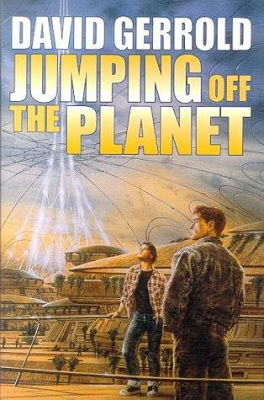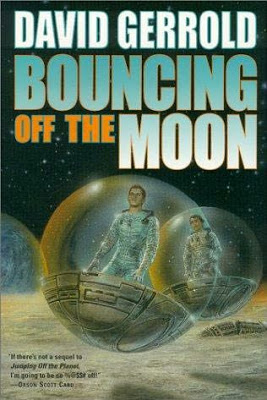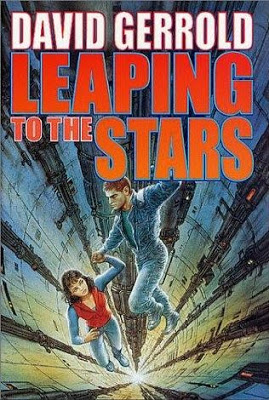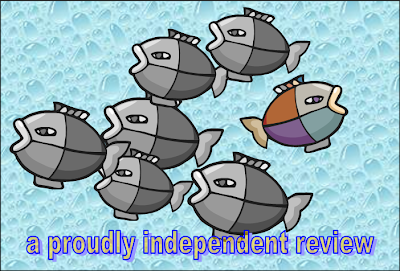 It’s the first Monday of the month, and while you’re still trying to figure out what happened to January, it’s already time for February’s Wicked Cool Overlooked Books!
It’s the first Monday of the month, and while you’re still trying to figure out what happened to January, it’s already time for February’s Wicked Cool Overlooked Books!
A recent conversation at The Spectacle had a lot of great things to say about series books. From writer tips on creating characters, to a discussion on what a writer who writes series owes to their readers, it was a wide-ranging and intelligent conversation with great input by all those involved. It got me thinking about “hard” science in young adult science fiction books, the kind of books I’d like to read and write, and a series I read years ago and really liked, and can’t believe I never told you about.
 Charles Dingillia — aka “Chigger” — lives underground in Bunker City, near El Paso, and is sick to death of his whole family. His parents basically hate each other, and his Dad, Max, has unforgivably walked out on his Mom, Maggie, leaving he and his brilliant older brother Douglas and his spoiled younger brother, Bobby — AKA “Stinky” — with nothing but vague promises, for his twice a year visits, of great trips to places like Disneyland. Of course, they’ve never been. Thus, Chigger greets his father’s grandiose suggestion that they go to the moon with a little Yeah, Dad, whatever shrug like it deserves.
Charles Dingillia — aka “Chigger” — lives underground in Bunker City, near El Paso, and is sick to death of his whole family. His parents basically hate each other, and his Dad, Max, has unforgivably walked out on his Mom, Maggie, leaving he and his brilliant older brother Douglas and his spoiled younger brother, Bobby — AKA “Stinky” — with nothing but vague promises, for his twice a year visits, of great trips to places like Disneyland. Of course, they’ve never been. Thus, Chigger greets his father’s grandiose suggestion that they go to the moon with a little Yeah, Dad, whatever shrug like it deserves.
Chigger knows very well they’re not going to the moon. For one thing, the Dingillia’s don’t do family trips. They’re always a disaster. They start out with Dad being jovial, then Stinky usually whines until he wets himself or throws up, and Douglas — aka “Weird” — is off in weirdville on his own, as usual. Chigger is stuck in the middle, asking his father awkward questions, which pisses him off enough to dump the lot of them at home again. Plus — Dad’s broke. He’s always broke. Add to that the fact that his mother has gotten a court order that straight out prevents his Dad from removing them from the planet — well, there you go. They’re not going. No matter how craptastic Earth is, no matter how high the UV danger on the surface, or how brown the smog-choked sky, just because other people are emigrating from the planet, doesn’t mean they’re going. The Dingillia’s are stuck, and they’re not going anywhere.
Except: they do. Dad comes and takes them for a month — a solid month — and they do tourist things like checking out meteor craters and everything. And then, they go… further, and Chigger is well aware that his father is maybe kind of kidnapping them. But — they’re in Ecuador! And they’re going up the space elevator! And maybe, just maybe his Dad really is finally going to make up for all the crap he put them through, and all the broken promises. And maybe, the Dingillia guys are going to hang together, and be okay.
…aaaand then again, maybe not.
 From the moment the orbital elevator reaches the top, it’s clear to Chigger that this isn’t a typical tourist trip. Immediately, there are people in uniforms, searching the tourists — has Mom called the authorities already? — and Chigger finds another kid blending in with the crowd, trying to evade notice. Of course, Stinky acts like the little spoiled brat he is, and Weird starts mooning after some guy he’s met, but something is more than a little off about this Dingillia Family Vacation. It seems that there are people following them — and they’re not just the people their mother has hired to find them. International — intergalactic?? — smuggling, kidnapping, and a whole lot of fleeing make up the bulk of this book — leavened by smart remarks, sibling spats, and moments of surprising kindness and humor. It takes a family law court and the word of a judge, but eventually Chigger gets to make his own choices about his family. The book explores the reality about who we come from being only a part of who we are — and that we choose who we want to be.
From the moment the orbital elevator reaches the top, it’s clear to Chigger that this isn’t a typical tourist trip. Immediately, there are people in uniforms, searching the tourists — has Mom called the authorities already? — and Chigger finds another kid blending in with the crowd, trying to evade notice. Of course, Stinky acts like the little spoiled brat he is, and Weird starts mooning after some guy he’s met, but something is more than a little off about this Dingillia Family Vacation. It seems that there are people following them — and they’re not just the people their mother has hired to find them. International — intergalactic?? — smuggling, kidnapping, and a whole lot of fleeing make up the bulk of this book — leavened by smart remarks, sibling spats, and moments of surprising kindness and humor. It takes a family law court and the word of a judge, but eventually Chigger gets to make his own choices about his family. The book explores the reality about who we come from being only a part of who we are — and that we choose who we want to be.
And that’s just the first book of three.
Gerrold wrote two other books in this series, and the wild adventures just continue. Things Chigger escaped from on Earth have a tendency to follow him, and more smugglers, courtrooms, judges, bounty hunters and more brushes with the law continue in Bouncing Off the Moon and Leaping for the Stars. In the end, Charles Dingillia finds the life he wants, and the family he needs, and gets to try out a whole bunch of really cool tech along the way.
 The word “juvenile” is used in many of the reviews of this book, coupled with the name “Heinlen,” which gives you a real clue to the seriously old, old, old-school tone of this book, despite the fact that it was published by Tor in 2000. While there are plenty of inclusive, modern touches in the novel, and a lot of discussion of ideas of gender identity and family, there are a lot of classic elements as well, including an in-depth exploration of the “what if” tech involved in geosynchronous orbit, which allowed for the creation of an orbital elevator to get people to the moon. These books also have a very aggressive storyline, which rapidly entangles the characters into multiple predicaments, which is fully a bow to the adventuring genius of Robert Heinlen. While novelist David Gerrold definitely has his SF writing chops, he isn’t entirely comfortable with the young adult voice, and the reason for that could in part be that he started publishing about five -ten years before AF and I were born. At first, I couldn’t suspend my disbelief in Chigger as a child, because the tone was pretty clunky — and more adult than it should have been, but the emotions behind Chigger’s Holden Caufield-esque observations on the world rang true, and his eventual and grudging affection for his family won me over.
The word “juvenile” is used in many of the reviews of this book, coupled with the name “Heinlen,” which gives you a real clue to the seriously old, old, old-school tone of this book, despite the fact that it was published by Tor in 2000. While there are plenty of inclusive, modern touches in the novel, and a lot of discussion of ideas of gender identity and family, there are a lot of classic elements as well, including an in-depth exploration of the “what if” tech involved in geosynchronous orbit, which allowed for the creation of an orbital elevator to get people to the moon. These books also have a very aggressive storyline, which rapidly entangles the characters into multiple predicaments, which is fully a bow to the adventuring genius of Robert Heinlen. While novelist David Gerrold definitely has his SF writing chops, he isn’t entirely comfortable with the young adult voice, and the reason for that could in part be that he started publishing about five -ten years before AF and I were born. At first, I couldn’t suspend my disbelief in Chigger as a child, because the tone was pretty clunky — and more adult than it should have been, but the emotions behind Chigger’s Holden Caufield-esque observations on the world rang true, and his eventual and grudging affection for his family won me over.
Somehow, I doubt this was marketed very heavily toward young adults — because how could it have just vanished without a trace like that? This is a good, energetic, intelligent trilogy for YA science geeks – guys or girls – and I think it would be fun to see it reissued with fresher science (in just a decade, so much of that “what if” tech has changed!) and a friendlier cover that doesn’t make futuristic twelve-year-olds look like they’re twenty-one and living in 1950.
 It’s an incredibly strong sense of adventure which will get us to leave the planet and inhabit stars. Feed the flame and buy Jumping Off the Planet, its sequel, Bouncing off the Moon, and the final volume in the trilogy, Leaping to the Stars from an independent bookstore near you!
It’s an incredibly strong sense of adventure which will get us to leave the planet and inhabit stars. Feed the flame and buy Jumping Off the Planet, its sequel, Bouncing off the Moon, and the final volume in the trilogy, Leaping to the Stars from an independent bookstore near you!
I don't think you've written about these on this site, but this reminded me that you recommended Gerrold's books to me some time ago and I forgot to look for them. (Lost the Post-It. That ought to tell me something about my filing system…)
Anyway, they sound fascinating. My library has the first one at least–and apparently Gerrold also wrote a Star Trek: Next Gen novel, Encounter at Farpoint (HA!) and something called Worlds of Wonder: How to Write Science Fiction and Fantasy. Plus a few more recent sci-fi titles. I'll have to take a look.
I can't in honesty say these look cool, cause they look horribly dated, or possibly like parodies of books that are horribly dated, but they do sound really cool, and so I will add them to my list!
These sound fun. Thanks for the recommendation, Tanita. I think I would have REALLY enjoyed them if they'd been around when I was a teen.
AF: OH, GOOD. I was beginning to think I'd lost my mind. I knew I'd rhapsodized to SOMEONE about these…
Char – don't know WHAT happened to the covers. Tor does some great stuff now, but apparently the earlier part of this millennium? Not so much.
Jen: The family dynamics stuff really is good in these – I'm again very surprised that they just weren't marketed more thoroughly, but at times, the SF market is awkward, and maybe the YA market was awkward in 2000 as well… they thought we were all Judy Blume, and we thought they were all Dune, and we couldn't see dating…?